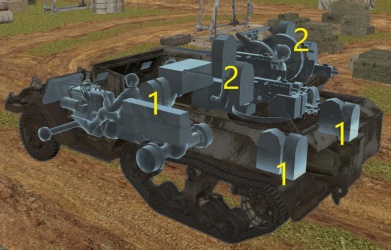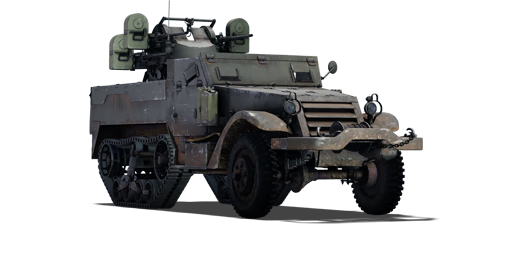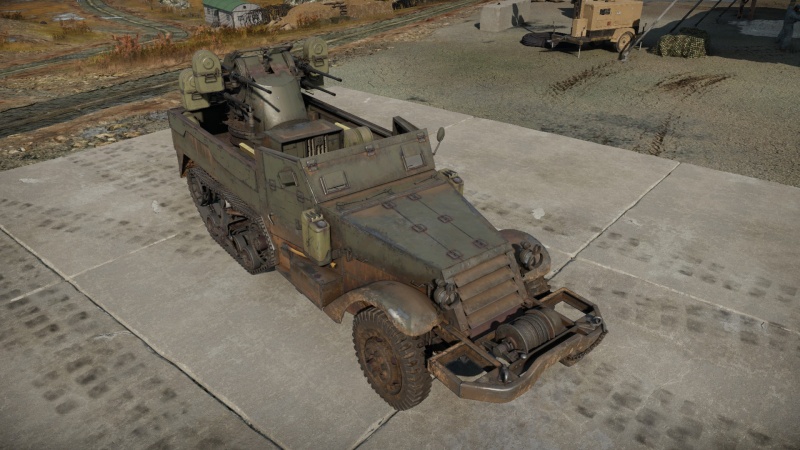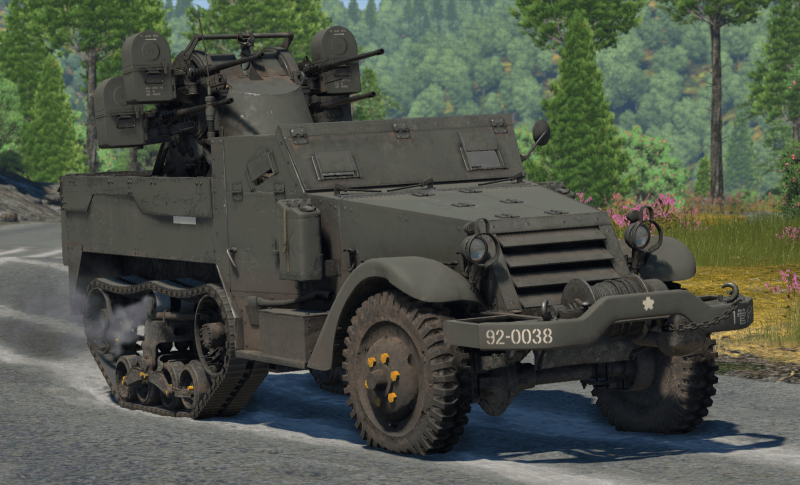Difference between revisions of "M16 MGMC (Japan)"
(Tag: Visual edit) |
(History section added alongside usage in battles.) (Tag: Visual edit) |
||
| Line 162: | Line 162: | ||
== History == | == History == | ||
<!-- ''Describe the history of the creation and combat usage of the vehicle in more detail than in the introduction. If the historical reference turns out to be too long, take it to a separate article, taking a link to the article about the vehicle and adding a block "/History" (example: <nowiki>https://wiki.warthunder.com/(Vehicle-name)/History</nowiki>) and add a link to it here using the <code>main</code> template. Be sure to reference text and sources by using <code><nowiki><ref></ref></nowiki></code>, as well as adding them at the end of the article with <code><nowiki><references /></nowiki></code>. This section may also include the vehicle's dev blog entry (if applicable) and the in-game encyclopedia description (under <code><nowiki>=== In-game description ===</nowiki></code>, also if applicable).'' --> | <!-- ''Describe the history of the creation and combat usage of the vehicle in more detail than in the introduction. If the historical reference turns out to be too long, take it to a separate article, taking a link to the article about the vehicle and adding a block "/History" (example: <nowiki>https://wiki.warthunder.com/(Vehicle-name)/History</nowiki>) and add a link to it here using the <code>main</code> template. Be sure to reference text and sources by using <code><nowiki><ref></ref></nowiki></code>, as well as adding them at the end of the article with <code><nowiki><references /></nowiki></code>. This section may also include the vehicle's dev blog entry (if applicable) and the in-game encyclopedia description (under <code><nowiki>=== In-game description ===</nowiki></code>, also if applicable).'' --> | ||
| − | + | Prior to the establishment of the Japanese Ground Self-Defense Force in July of 1954, the Japanese were delegated with a security force called the "National Safety Force" (1952-1954). Similar in function to national police, they were trained by American officers and equipped with American military equipment including most firearms and uniforms. Limited under treaty from building their own military designs, Japan sought assistance from the US to provide its heavy equipment. In particular, Japanese personnel were supplied with 168 M16 half-tracks for logistical needs but also close infantry support. M45 turrets with quad .50 cal mountings were supplied from surplus American stocks and fitted to the vehicles. Under the 1st District Force (NSF), the first anti-air units were comprised using the "hand-me down" M16s. These vehicles would pass into the JGSDF in 1954 and while they would see use until 1974, almost 20 years after America had discontinued their M16s, they eventually were deemed obsolete for their primary purpose. | |
== Media == | == Media == | ||
Revision as of 03:05, 29 March 2022
| This page is about the SPAA M16 MGMC (Japan). For other half-track vehicles based on the M3, see M3 Half-Track (Family). |
Contents
Description
The Multiple Gun Motor Carriage M16 is a rank II Japanese SPAA with a battle rating of 2.7 (AB/RB/SB). It was introduced in Update "Direct Hit".
General info
Survivability and armour
Armour type:
- Rolled homogeneous armour
| Armour | Front (Slope angle) | Sides | Rear | Roof |
|---|---|---|---|---|
| Hull | 6.35 mm (31°) Hood front 12.7 mm (31°) Driver port |
6.35 mm | 6.35 mm | N/A |
| Turret | 12.7 mm | N/A | N/A | N/A |
Notes:
- Suspension bogies are 10 mm thick, suspension wheels are 15 mm thick, and tracks are 7 mm thick. Front wheels provide 2 mm armour.
Mobility
| Game Mode | Max Speed (km/h) | Weight (tons) | Engine power (horsepower) | Power-to-weight ratio (hp/ton) | |||
|---|---|---|---|---|---|---|---|
| Forward | Reverse | Stock | Upgraded | Stock | Upgraded | ||
| Arcade | 83 | 19 | 8.6 | 210 | 282 | 24.42 | 32.79 |
| Realistic | 76 | 18 | 131 | 148 | 15.23 | 17.21 | |
Modifications and economy
Armaments
Main armament
| 12.7 mm M2HB (x4) | Turret rotation speed (°/s) | Reloading rate (seconds) | ||||||||||||
|---|---|---|---|---|---|---|---|---|---|---|---|---|---|---|
| Mode | Capacity (Belt) | Fire rate | Vertical | Horizontal | Stabilizer | Stock | Upgraded | Full | Expert | Aced | Stock | Full | Expert | Aced |
| Arcade | 4,800 (200) | 576 | -10°/+90° | ±180° | N/A | 52.8 | 73.1 | 88.8 | 98.2 | 104.5 | 18.20 | 16.10 | 14.84 | 14.00 |
| Realistic | 35.7 | 42.0 | 51.0 | 56.4 | 60.0 | |||||||||
Ammunition
- Common: API-T · I · AP · API-T
- API: API-T · AP-I · API-T
- AP: AP · AP · API-T
- APIT: API-T
| Penetration statistics | ||||||
|---|---|---|---|---|---|---|
| Belt | Penetration @ 0° Angle of Attack (mm) | |||||
| 10 m | 100 m | 500 m | 1,000 m | 1,500 m | 2,000 m | |
| Common | 31 | 30 | 26 | 22 | 18 | 15 |
| API | 30 | 29 | 24 | 20 | 16 | 13 |
| AP | 31 | 30 | 26 | 22 | 18 | 15 |
| APIT | 30 | 29 | 24 | 20 | 16 | 13 |
| Belt details | |||||||||
|---|---|---|---|---|---|---|---|---|---|
| Belt | Type of warhead |
Velocity (m/s) |
Projectile Mass (kg) |
Fuse delay (m) |
Fuse sensitivity (mm) |
Explosive Mass (TNT equivalent) (g) |
Ricochet | ||
| 0% | 50% | 100% | |||||||
| APIT | API-T | 929 | 0.04 | N/A | N/A | N/A | 47° | 56° | 65° |
Ammo racks

| Full ammo |
1st rack empty |
2nd rack empty |
Visual discrepancy |
|---|---|---|---|
| 24 | 12 (+12) | 0 (+24) | Yes |
Notes:
- Although there are 24 ammo boxes, only 10 are modeled including 4 loaded on the machine guns.
- Since there are four .50 M2HB machine guns, each reload will load 4 ammo boxes onto the guns with each box containing 200 rounds.
Usage in battles
Being identical to its American counterpart, the JSDF M16 variant processes the same strategy, strengths and weaknesses.
For setup, first of all go to a good open spot, most times it is enough to stay in the spawn point. Best ammunition for this vehicle are API (Armour Piercing Incendiary bullet) or APIT (Armour Piercing Incendiary Tracer bullet), as the specialized AP belt doesn't offer a significant advantage.
"The Meat Chopper" is inaccurate when enemy planes are operating at high altitudes, but in these cases, its function is more psychological than effective. Shooting short bursts at enemy planes at high altitudes will show them that the team is always covered by AA fire and it won't be an easy task a ground attack.
When an enemy is diving, the best way to defend the attack is by creating a thick fire curtain with prolonged bursts. The most vulnerable moment for aircraft is when they just dropped bombs or rockets and climb again. They're flying very slow and become easy targets. Take care if planes are attacking. Fighters with their MG's and cannons are a great menace. So start moving while firing and take cover behind trees or even buildings.
Watch out for remaining ammunition. The M16 MGMC has 800 rounds to shoot but reloading is very slow, making the M16 MGMC and the team vulnerable in the worst moments. More than 200 rounds is a good margin.
Don't try to do anti-tank tasks, the M16 MGMC is equipped with 50 cal. Machine guns are not as effective as cannons at fighting more armored vehicles, as they have much less penetration, so stay at the spawn point and do anti-aircraft work. The machine gun tracers can reveal enemy snipers position shooting, allowing teammates to see them, but it's not advisable.
In addition, artillery barrages are very dangerous, move immediately and relocate.
Pros and cons
Pros:
- Strong machine guns that can shred aircraft with a well-aimed burst
- Good mobility; accelerates quickly, fast on flat ground, and can turn in place unlike wheeled SPAA
- Fast turret traverse allows for easily tracking any aircraft
- Decently accurate while moving
- Machine guns can knock out some open-topped or lightly armoured vehicles
Cons:
- Any armament above light machine guns (<7.92mm) poses a threat
- Vulnerable to explosive rounds and bombs dropped by aircraft due to it being open top
- Very light, cannot pull or tow most friendly vehicles
- Can easily be taken out by an aircraft with one well-aimed pass; the entire crew is exposed
- Cannot turn on the spot well, as it is a half-track
History
Prior to the establishment of the Japanese Ground Self-Defense Force in July of 1954, the Japanese were delegated with a security force called the "National Safety Force" (1952-1954). Similar in function to national police, they were trained by American officers and equipped with American military equipment including most firearms and uniforms. Limited under treaty from building their own military designs, Japan sought assistance from the US to provide its heavy equipment. In particular, Japanese personnel were supplied with 168 M16 half-tracks for logistical needs but also close infantry support. M45 turrets with quad .50 cal mountings were supplied from surplus American stocks and fitted to the vehicles. Under the 1st District Force (NSF), the first anti-air units were comprised using the "hand-me down" M16s. These vehicles would pass into the JGSDF in 1954 and while they would see use until 1974, almost 20 years after America had discontinued their M16s, they eventually were deemed obsolete for their primary purpose.
Media
Excellent additions to the article would be video guides, screenshots from the game, and photos.
See also
Links to the articles on the War Thunder Wiki that you think will be useful for the reader, for example:
- reference to the series of the vehicles;
- links to approximate analogues of other nations and research trees.
External links
Paste links to sources and external resources, such as:
- topic on the official game forum;
- other literature.
| Japan anti-aircraft vehicles | |
|---|---|
| Ke-Ni Derivatives | Ta-Se · So-Ki |
| Wheeled | Type 94 |
| Tracked | SUB-I-II |
| Radar SPAAG | Type 87 |
| Missile SPAA | Type 93 · Type 81 (C) |
| USA | ▅M16 MGMC · ▅M19A1 · ▅M42 |






